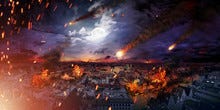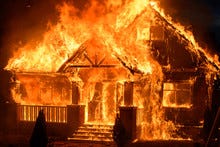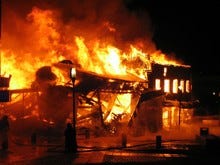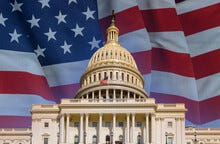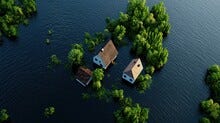Every year seems to have a word. There is no question that the word for 2025 is apocalyptic. It seems to be the word that most satisfies both lay and professional individuals trying to describe what is happening in Los Angeles, or maybe better put, to Los Angeles.
Let’s start with a definition. The Oxford Languages Dictionary defines apocalyptic as “describing or prophesying the complete destruction of the world, or resembling the end of the world; momentous or catastrophic.” It offers synonyms: momentous, ominous, portentous, life-and-death, and serious.” To me, given the situation, serious is a great understatement for describing LA’s fire situation. One looks at what the cameras show us and what we see is apocalyptic. The ruins hold decades of befores but only question marks for afters.
As I write this, those hurricane-force Santa Anna winds are again revving up. Everyone is holding their breath that they won’t pick up pieces of the fires and throw them down, like bolts from Zeus, to start yet more fires. Getting one’s head around any part of what is happening is hard. At one point, the Palisades Pacific fire consumed land and what was on it at a rate of 300 football fields a minute! What does 37 square miles mean? This means that if this fire were where I am sitting in Boca Raton, the entire city of 27 square miles would be gone. Excuse me for letting my thoughts run away, but we may find out that arsonists started one or two of the fires. If caught, there isn’t a punishment too severe for them. Death would be too easy. Yes, arson is the work of a diseased mind. Sometimes, that’s not a good enough reason. Read on.
If we drew straight lines to replace square miles to the north, the fire would extend past and engulf Palm Beach International Airport, meaning it would traverse Delray, Lantana, Hypoluxo, Lake Worth, West Palm Beach, and Palm Beach Gardens. Going south, it would extend past Ft. Hollywood Airport-Ft. Lauderdale airport, traversing Deerfield, Pompano Beach, Oakland Park, and Wilton Manors and be on its way to Hollywood. In other words, it would take out all of eastern Broward County.
For Floridians who lived through Hurricane Andrew, you know what disorientation means. You saw entire neighborhoods razed. You dealt with the complete removal of those signposts one uses in one’s hometown for directions—that oddly shaped tree, the house painted that awful purple color (“What were they thinking? you’d always say to yourself as you made your turn on autopilot), and of course street signs. There was no electricity. At night, “dark” took on new meaning. And you dealt with the irony that there was no water to drink in some places because of all the water from the storm.
But fire, that’s different. Just the thought of fire strikes fear into people that sears the soul. Animals know. They take off. At the first hint of it, they become bundles of nerves. They are excellent early warning systems. They give off signals. You know it’s time to go if one can read them correctly.
In hurricanes and tornadoes, things get blown around and carried about. Living during a tornado in Atlanta, I saw a freight train locomotive tossed about like it was from a Lionel train set. I also saw a woman, who should have immediately gone out and bought a lottery ticket because she survived, get picked up in her car and dropped to the ground hundreds of yards from where she was parked.
But fire. In trying to use any descriptive talents I have, I fall short. Part of the problem is that you don’t get the smell on television. Thank goodness whatever technology it takes to give us that hasn’t been put to use yet. Most everyone knows the smell of a large fire that has been extinguished. It is the smell of smoke and ash. There is that searing feeling when you try to inhale. Multiply that by 37 square miles. Let us not even think about the 24 and counting souls who died. For me, the sight that says apocalyptic is the automobiles. They are frames. The fire is so hot that it melts the steel and creates aluminum puddles under the frames. Think of that. Puddles of melted metal.
The intent here is not to continue scraping to the bottom of my vocabulary barrel for more descriptors. No, the intent here is to take you past the apocalypse and remind you that there are things we must do for our fellow human beings.
One is give. Prayers are needed and wonderful, but you can’t wear them and you can’t buy things with them. Find an organization—The Red Cross, The Salvation Army, your house of worship, well-known long-standing non-profit relief agencies—that is sending things to the victims. Give money. Give things. Remember, the survivors have nothing.
Another is advocate. America is moving into a political era of smaller government doing less for people. It is a legitimate political position. The irony is that it comes as we’ve been given a monstrous moment when just the opposite is needed. Every elected official at every level of government can and should play a part in this recovery. Unless you tell them that you, their constituent, demand it of them, they won’t. Remember, there but for the grace of G-d, as the saying goes…
Finally, only because while one can write tomes, people mostly can’t read them, think and act. Each of the last 10 years has been the hottest year on record. Each year, more tornadoes and hurricanes have occurred than the last, and each year, each has had more powerful tornadoes than the last. Hot places are hotter than ever; wet places that are by the water are wetter than ever. You should know but probably don’t, that there are islands in the Pacific where evacuations are already taking place because, in the lifetime of the citizens, those island nations will be gone. Submerged.
Along with them will go coastal neighborhoods in every state bordering the ocean or the Great Lakes. The rivers are already washing away parts of cities. The Netherlands and the City of Venice have built walls in the ocean to help protect from sea rise. New York and other coastal cities are in the planning stages for such protections. New Orleans is revamping and rebuilding its levee system so Lake Pontchartrain doesn’t turn the city into a bathtub. Things you only saw in disaster movies will happen in real life. Fantasy will become fact.
Ladies and gentlemen, it is time to stop listening to nay-sayers and doubting Thomas’. It is time to think. If you think, you will conclude that everything that is happening isn’t one big coincidence. All that is needed is for you to believe in climate change. If you do, the “what to do about it,” will finally follow. If you don’t, we face hell on earth.



